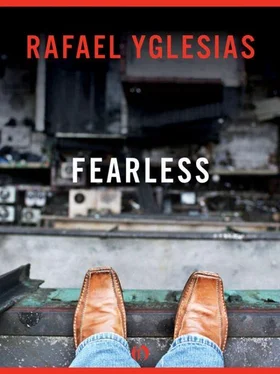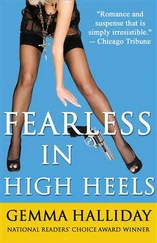Old clients were hurt or concerned. “Are you okay?” one asked and then added, with a nervous laugh, “Guess you’ll be glad to be rid of your pain-in-the-ass customers.”
“Yes,” Max agreed, calm and unimpressed by their reactions. He moved through conversations and day-to-day errands as if he were a passenger on an express train watching small towns go by; they blocked his vision for a moment, only to be quickly forgotten by his steady, armored progress.
He took a final walk through the empty offices on Thanksgiving morning to make sure everything had been taken. Shutting the door behind him, he decided to leave it unlocked since there was nothing to steal. He had a moment of fear, the bitter taste of cowardice rising from a hollow stomach, and then bursting through it came happiness: he was walking away from the scene of so much compromise and frustration.
Thanksgiving dinner was held, as usual and as required, at his mother-in-law’s. Required because her self-satisfaction and family fame came as a cook. Flora shared Debby’s height, excellent posture, and slow, graceful movements; but decades of dinner parties for her husband’s academic colleagues and family celebrations had thickened her body and given her face the warm, well-fed appearance of mothers in children’s book illustrations. And she played the role as well, treating her forty-year-old daughter as if she were six and maintaining a quiet but ominous presence about her grandson’s health, like that of a Secret Service agent guarding the President.
Shortly after two in the afternoon Max, Debby and Jonah walked to his in-laws’ apartment on 103rd and Riverside. It was a dangerous neighborhood when Max and Debby first married. Harry and Flora bore the danger because their ten-room apartment with a high unblocked view of the river and a working fireplace was cheap and kept cheap by rent-control laws. Besides, his father-in-law Harry could walk to work at Columbia University — even though he was mugged once a year. He once went to the hospital to be stitched but otherwise was not badly hurt.
The indiscriminate renovations and conversions of the 1980s had changed the area. It was now an expensive dangerous neighborhood. Since their building had gone co-op, they paid a large monthly mortgage and an ever rising monthly maintenance. Of course on paper, at the height of the real estate boom, they could have claimed to be millionaires. Boom or bust, however, Harry continued to be mugged yearly.
Max was not happy about this year’s gathering. In line with tradition, Max’s mother and sister were both coming, but this year Nan and her two fatherless boys would also be there because Nan had quarreled with her own parents. She insisted on living in New York City rather than moving in with them in New Jersey and saving money. This combination of people didn’t seem promising, but that wasn’t the worst of it. As they walked up Riverside Drive, Debby told Max that her mother had also invited Byron and his parents at the last minute. That was odd. Even odder was the fact that they had accepted.
Presumably they had said yes because Byron was still fixed on Max as a living security blanket, even though four months had passed. The boy didn’t make any demands on Max; Byron simply wanted to be in his company. His parents had arranged for Byron to be dropped off at Max’s office after school on Tuesdays and Thursdays — Mondays he had after-school French lessons; Wednesdays he took a course for kid chess whizzes taught by a Russian émigré; Fridays his parents left early for their country house in Connecticut. He liked to sit at Jeff’s desk, near to Max, do his homework and then play chess against a portable computer outfitted with a tiny board and miniature pieces. He promised to be quiet. He was. But he was still there, occasionally exclaiming with dismay or triumph, his machine beeping whenever it made a move and playing songs of victory or dirges of defeat.
Max got tired of the sounds of intellectual combat and had recently set up Byron with art materials. The idea really came from Byron’s father, Peter Hummel. Peter had taken Max aside to say that Byron was obsessed with painting and drawing before the crash but had given them up since. He expressed surprise that Byron hadn’t asked to borrow Max’s colored pencils. He told Max he hoped Byron would go back to his artwork soon. Next visit Max put out all the drawing materials on Jeff’s desk. Byron didn’t want to draw, however, at least not people or things. He wanted to design buildings like Max. He pored through architectural manuals and Max’s finished designs. That impressed Max, but Byron’s haste didn’t. He scanned the manuals, absorbing images impatiently, eager to make his own. Lately, he had sketched a prodigious number of elaborate complexes that Byron said, “People will live in someday, when there’s no more room on earth for homes.” In fact, they reminded Max of medieval fortresses, with cramped quarters and a central court ringed by grim defenses.
Peter was pleased and undisturbed by his son’s renderings. “What a complicated and intricate mind,” he commented to Max while Byron gathered his school things, out of earshot.
“I think it shows a desire for security,” Max said.
Peter spread his hand possessively over the onionskin paper Max had laid over Byron’s design. “Oh, I don’t think so. I think he wants people to live communally. This stuff is really neat,” he said and added casually, “I guess your son must have been drawing plans like this since he was a baby.”
“No,” Max said. “My son has no interest in architecture.”
Peter made no comment. He raised his eyebrows in surprise and looked slightly pleased. Max suspected him of thinking something was superior about Byron for showing such interest. Suspecting Byron’s parents of having a feeling was as close as Max could get to hearing them express one. They had an odd, detached manner. They continued to be grateful to Max, but diffidently. Sometimes their thanks even took the form of a teasing rebuke that Max was easily duped.
“Thank you again,” Peter said one afternoon as he and Byron left. “You don’t mind if tomorrow I bring my senile grandmother? The adult diapers have great capacity. She only needs to be changed twice a day.”
The Hummels had attempted polite material compensations, inviting Jonah to share their box seats to Mets games, inviting Max and Debby to use their spare Phantom of the Opera tickets. Since tickets to me show were sold out for months into the future and were known to cost hundreds of dollars if bought through scalpers, the adjective “spare” caused Debby to laugh, then flush, and finally mumble to Max, “They must be richer than God.” And the Hummels had attempted a more integrated family friendship, inviting Max, Debby and Jonah out to Connecticut for the weekend. Debby wanted to go, but Max declined. He resisted any attempt at forcing a friendship between his son and Byron; and he had no interest in knowing the parents. Besides, he believed Jonah didn’t like Byron. He didn’t know what he felt about Byron for that matter. He only knew that he couldn’t ignore the child’s need for him, that he was responsible somehow. Nevertheless, Max didn’t think he had to take on the parents as well, and especially not on national holidays.
“I don’t want to go,” he said, coming to a stop on the corner of One Hundred Third Street.
“Come on,” Debby said and ambled on. She reached for Jonah; her long dancer’s arm, even in a down coat, made an elegant hook in the air.
“It’s absurd,” Max said, resuming his steps. “We don’t know these people.”
“You know Byron,” she said, capturing Jonah’s head with the crook of her right arm. Since the crash they were closer than ever. Jonah seemed to snuggle with her more than he used to as a toddler. “You see more of him than you see of us.”
Читать дальше












